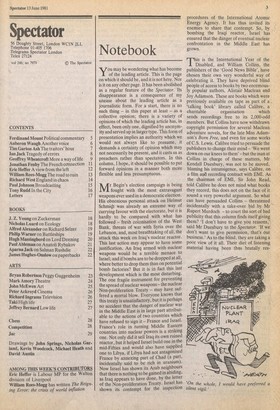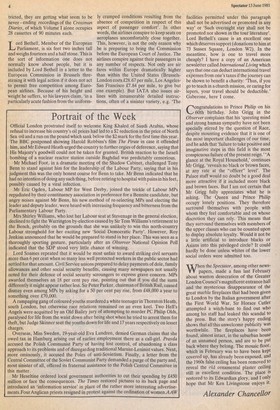Notebook
Yon may be wondering what has become of the leading article. This is the page on which it should be, and it is not here. Nor is it on any other page. It has been abolished as a regular feature of the Spectator. Its disappearance is a consequence of my unease about the leading article as a journalistic form. For a start, there is no such thing — in this paper at least — as a collective opinion; there is a variety of opinions of which the leading article has, in effect, been only one, dignified by anonymity and served up in larger type. This form of presentation implies an authority which we would not always like to presume, it demands a certainty of opinion which may not necessarily be present, and it casts us as preachers rather than spectators. In this column, I hope, it should be possible to put forward opinions in a manner both more flexible and less presumptuous.
Mr Begin's election campaign is being fought with the most extravagant weapons ever used in a democratic election. His obnoxious personal attack on Helmut Schmidt was already an extreme way of currying favour with the electorate, but it is hardly to be compared with what has followed — fresh colonisation of the West Bank, threats of war with Syria over the Lebanon, and, most breathtaking of all, the attack this week on Iraq's nuclear reactor. This last action may appear to have some justification. An Iraq armed with nuclear weapons would be a terrible menace to Israel; and if bombs are to be dropped at all, where better to drop them than on potential bomb factories? But it is in fact this last development which is the most disturbing. The one fragile instrument for preventing the spread of nuclear weapons— the nuclear Non-proliferation Treaty — may have suffered a mortal blow. Everyone knows that this treaty is unsatisfactory, but it is perhaps no accident that the danger of nuclear war in the Middle East is in large part attributable to the actions of two countries which have refused to sign it — France and Israel. France's role in turning Middle. Eastern countries into nuclear powers is a striking one. Not only did it sell Iraq its own ruined reactor, but it helped Israel build one in the mid-Fifties and would also have supplied one to Libya, if Libya had not antagonised France by annexing part of Chad (a part, incidentally said to be rich in uranium). Now Israel has shown its Arab neighbours that there is nothing to be gained in abiding, as Iraq appears to have done, by the letter of the Non-proliferation Treaty. Israel has shown its contempt for the inspection procedures of the International Atomic Energy Agency. It has thus invited its enemies to share that contempt. So, by bombing the Iraqi reactor, Israel has ensured that the danger of eventual nuclear confrontation in the Middle East has grown.
This is the International Year of the Disabled,. and William Collins, the publishers of the 'Good News Bible', have chosen their own very wonderful way of -.celebrating it. They have deprived blind. people of access to books by two enormously popular authors, Alistair Maclean and Joy Adamson. These are books which were previously available on tape as part of a 'talking book' library called Calibre, a charitable organisation which sends recordings free to its 2,000-odd members. But Collins have now withdrawn copyright permission for several Maclean adventure novels, for the late Miss Adamson's Born Free, and even for some works of C.S. Lewis. Calibre tried to persuade the publishers to change their mind — 'We went down on our knees to them' — but the man at Collins in charge of these matters, Mr Kendall Duesbury, was not to be moved, blaming his intransigence, says Calibre, on a film and recording contract with EMI. As the chairman of EMI, Sir John Read, told Calibre he does not mind what books they record, this does not on the face of it sound a very powerful argument. So what can have persuaded Collins — threatened incidentally with a take-over bid by Mr Rupert Murdoch — to court the sort of bad publicity that this column finds itself giving them? 'I don't have to give you reasons,' said Mr Duesbury to the Spectator. 'If we don't want to give permission, that's our business.' As to the blind, they are taking a poor view of it all. Their diet of listening material having been thus brutally res tricted, they are getting what seem to be never — ending recordings of the Crossman Diaries, of which Volume I alone occupies 28 cassettes of 90 minutes each.
Lord Bethell, Member of the European Parliament, is six feet two inches tall and weighs fourteen and a half stone. This is the sort of information one does not normally know about people, but it is included by Lord Bethel! in a letter to the European Commission in Brussels threatening it with legal action if it does not act to permit free competition among European airlines. Because of his height and weight he suffers, so his lawyers claim, 'in a particularly acute fashion from the uniform ly cramped conditions resulting from the absence of competition in respect of this aspect of passenger comfort'. In other words, the airlines conspire to keep seats on aeroplanes uncomfortably close together. This, however, is not the only reason why he is preparing to bring the Commission before the European Court of Justice. The airlines conspire against their passengers in any number of respects. Not only are air fares within Europe dramatically higher than within the United States (BrusselsLondon costs £28.67 per mile, Los AngelesSan Francisco £7.84 per mile, to give but one example). But IATA also issues airlines with innumerable detailed instructions, often of a sinister variety, e.g. 'The facilities permitted under this paragraph shall not be advertised or promoted in any way' or 'Such overnight stay shall not be promoted nor shown in the tour literature'. Lord Bethell's cause is an excellent one which deserves support (donations to him at 73 Sussex Square, London W2). In the meantime, how is one to travel more cheaply? I have a copy of an American newsletter called International Living which says that one can deduct international travel expenses from one's taxes if the journey can be shown to benefit a charity: 'Thus, if you go to teach in a church mission, or caring for lepers, your travel should be deductible.' Gaberone, here I come.
Clongratulations to Prince Philip on his 60th birthday. John Grigg in the Observer complains that his 'questing mind and strong human sympathy have not been specially stirred by the question of Race, despite mounting evidence that it is one of the most important challenges of our time; and he adds that 'failure to take positive and imaginative steps in this field is the most conspicuous failure of the present reign.' A glance at the Royal Household,' continues Mr Grigg, 'reveals no black or brown faces, at any rate at the "officer" level'. The Palace staff would no doubt be a good deal more attractive if it included more black and brown faces. But I am not certain that Mr Grigg fully appreciates what he is asking. The Queen and Prince Philip occupy lonely positions. They therefore surround themselves with people with whom they feel comfortable and on whose discretion they can rely. This means that they surround themselves with members of the upper classes who can be counted upon to display absolute loyalty. Would it not be a little artificial to introduce blacks or Asians into this privileged circle? It could hardly be done unless whites of the lower social orders were admitted too.
When the Spectator, among other newspapers, made a fuss last February about wanton desecration of the Greater London Council's magnificent entrance hall and the mysterious disappearance of the great marble fireplaces that had been given to London by the Italian government after the First World War, Sir Horace Cutler attempted a witch-hunt to find out who among his staff bad leaked this scandal to the press. But the story's happy ending shows that all this unwelcome publicity was worthwhile. The fireplaces have been found, almost intact, in the suburban house of an unnamed person, and are to be put back where they belong. The mosaic floor, which in February was to have been kept covered up, has already been exposed, and the 1960s false ceiling has been removed to reveal the old ornamental plaster ceiling still in excellent condition. The place is restored to its Edwardian glory, and I onlY hope that Mr Ken Livingstone enjoys it.
Alexander Chancellor







































 Previous page
Previous page